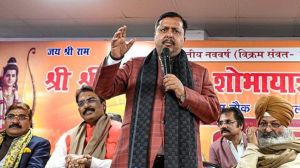One busy weekend
In counting off the achievements of a bilateral meeting, Indian and Pakistani leaders cannot have ever before been this spoilt for choice. T...

In counting off the achievements of a bilateral meeting, Indian and Pakistani leaders cannot have ever before been this spoilt for choice. Try answering this. What is the pre-eminent gain of Pervez Musharraf8217;s weekend visit to New Delhi? The promise of enhanced economic ties, including reiterated support in a joint statement for the gas pipeline? The resolve to gather pace towards a soft border? Acknowledgement that rhetoric on Kashmir will not do, that solutions have to be 8220;out of the box8221;? Or, the commitment that the entire peace process is now irreversible? In a process that began exactly two years ago, to the day, the greatest gain has to be the realism that is now firmly attached to negotiations between the two leaderships. Yes, every point in Manmohan Singh8217;s and Musharraf8217;s joint statement carries increased potential for cooperation and inter-dependence. But the triumph of this busy weekend lies in the measured pace of cooperation, in the incremental nature of the peace process.
The joint statement 8212; issued at the close of Musharraf8217;s visit 8212; commits the two countries to working towards a mutually acceptable settlement of the Jammu and Kashmir issue. Alongside, it deepens the scope for movement and contact, by putting travel and trade at the centre of India-Pakistan engagement. Some estimates put the potential for bilateral trade at 10 billion by 2010. To achieve that, India and Pakistan will of course have to address the issue of tariff barriers and logistical impediments. In the meanwhile, the commitment to the gas pipeline is welcome. It is 8212; like the Srinagar-Muzaffarabad bus earlier 8212; an issue that will test the two countries8217; maturity in addressing each other8217;s concerns. In making it a reality and securing both India and Pakistan8217;s energy requirements, success on the pipeline will consolidate inter-dependence and mutual trust, which are bound to serve as force multipliers.
Foreign policy is most potent when it dovetails with domestic consensus. Both India and Pakistan at this moment in time share that happy circumstance. Pakistan, post-9/11, is in the throes of efforts to re-order its economy. India, for its part, knows that it can never be at peace with itself amidst acrimony with its neighbours. Neither can attack issues of national interest as long as anxiety over the other prevails. If we play it right, in this positive sum game, both could emerge as huge winners.
- 01
- 02
- 03
- 04
- 05































